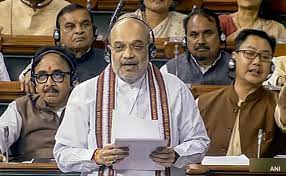India’s Colonial-Era Criminal Laws Bid Farewell: Lok Sabha Ushers in “Bharatiya” Era
In a momentous yet controversial session, the Lok Sabha on Wednesday bid adieu to three pillars of India’s colonial-era legal system, replacing them with a trio of newly minted bills – the Bharatiya Nyaya (Second) Sanhita, Bharatiya Nagarik Suraksha (Second) Sanhita, and the Bharatiya Sakshya (Second) Bill. These sweeping reforms, introduced by Union Home Minister Amit Shah, aim to reshape India’s criminal justice landscape, replacing the Indian Penal Code of 1860, the Code of Criminal Procedure Act of 1898, and the Indian Evidence Act of 1872, respectively.
The proceedings, carried out by voice vote, unfolded in the absence of 97 Opposition MPs, suspended amidst allegations of misconduct and unruly behavior during the ongoing Winter Session. This absence fueled accusations of a rushed process lacking proper debate and scrutiny, casting a shadow over the historic occasion.
Undeterred, Shah championed the new legislation, asserting that it stemmed from extensive consultations and meticulous attention to detail. “Even commas and full stops were carefully considered,” he declared, emphasizing the deliberate nature of the overhaul.
More than just technical precision, Shah envisioned these bills as catalysts for a transformative shift in India’s legal narrative. He spoke of moving beyond the colonial “punishment-centric” mentality towards a “justice-driven” system rooted in Indian values. “These laws,” he asserted, “liberate us from the colonial mindset and its oppressive symbols.”
This ambitious vision, however, sparked a firestorm of debate. Critics voiced concerns about the lack of transparency and public engagement in the drafting process. Questions swirled around the specific provisions of the new bills, their potential impact on individual rights and liberties, and the need for thorough examination before implementation.
Amidst the applause and the dissent, one thing remains clear: India’s legal framework is on the cusp of a drastic evolution. The “Bharatiya” era of criminal law dawns, promising a system tailored to contemporary India’s needs and aspirations. Yet, the journey ahead seems likely to be paved with rigorous scrutiny, demanding open dialogue and meticulous analysis to ensure a just and equitable future for all.




